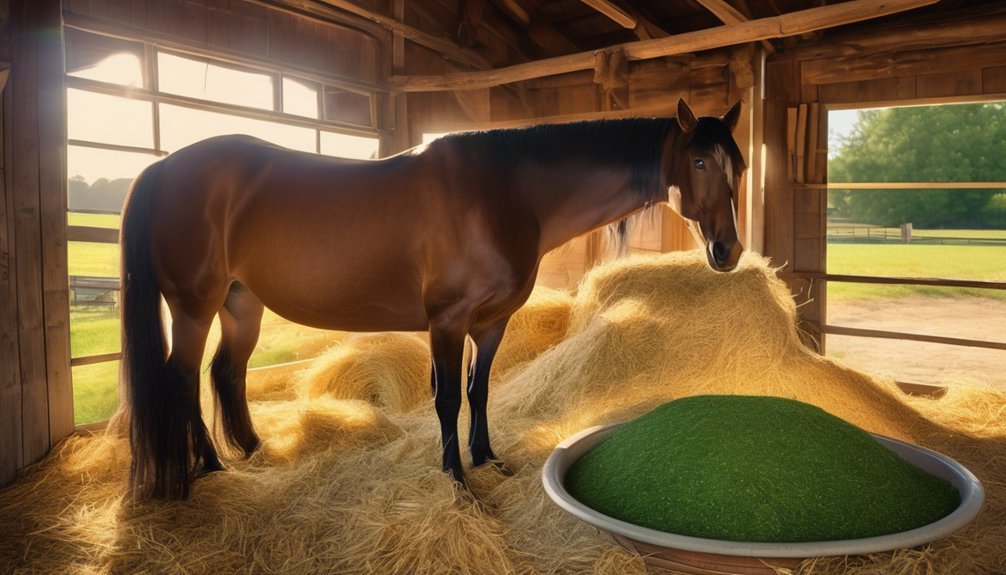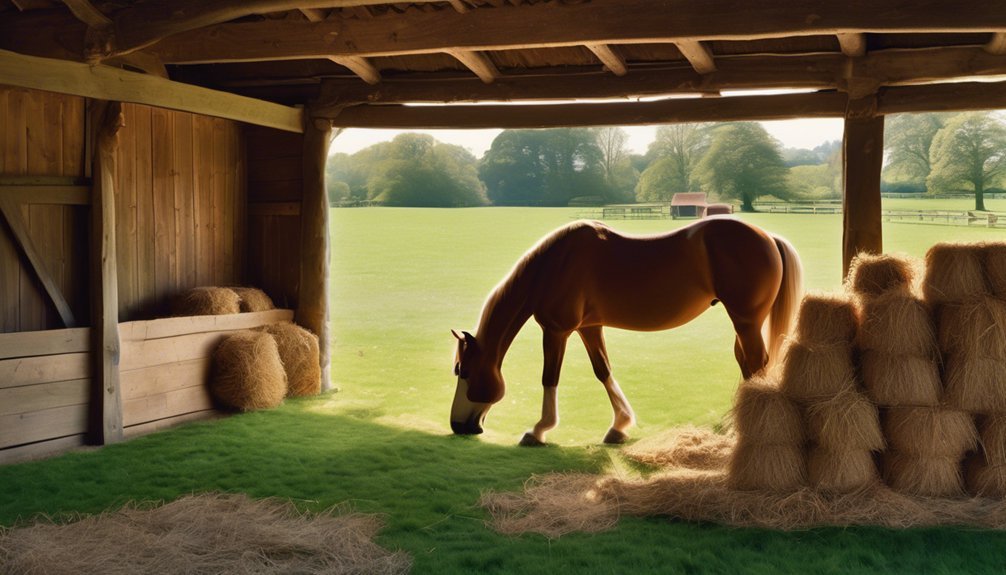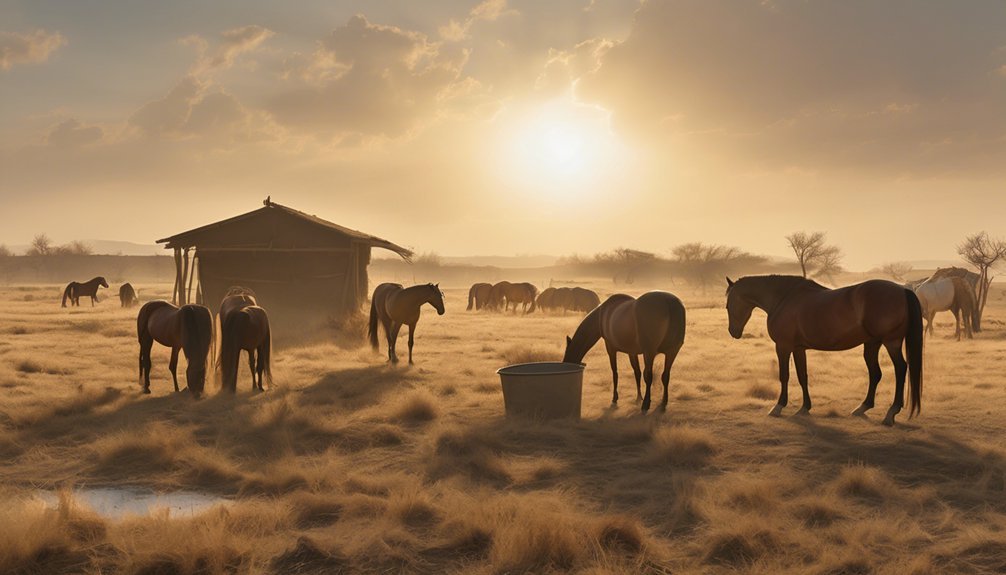
Think of your horse's diet as the foundation of a healing home, vital for recovery from illness or injury. A carefully crafted nutrition plan is essential, focusing on high-quality forage and balanced supplements. It's important to understand how each part of their diet influences their overall well-being. As you navigate this journey, you'll discover strategies that can significantly impact your horse's recovery process. What adjustments will you consider to support their healing?
Key Takeaways
- Provide high-quality forage as the foundation of the diet to ensure adequate fiber and essential nutrients for recovery.
- Incorporate balanced supplements, such as vitamins and probiotics, to address specific nutritional deficiencies during recovery.
- Maintain hydration with fresh water access and consider electrolyte solutions to support optimal nutrient absorption.
- Tailor feeding strategies with smaller, frequent meals for digestive health and adjust based on the horse's specific recovery needs.
- Regularly assess forage quality and palatability to encourage consistent eating and improve overall recovery outcomes.
Understanding Nutritional Needs During Recovery

When a horse is recovering from an injury or illness, understanding its nutritional needs becomes crucial for a successful rehabilitation. You need to focus on nutrient timing—providing essential nutrients at specific intervals to support healing. This ensures your horse receives energy when it's most needed, promoting recovery.
Equally important is maintaining digestive health. A balanced diet rich in fiber helps prevent colic and other digestive issues, which can be detrimental during recovery.
Incorporate easily digestible feeds and consider adding probiotics to support gut health. Remember, every horse is unique, so it's vital to tailor their nutrition based on their specific needs and recovery progress.
The Role of High-Quality Forage
High-quality forage plays a vital role in the recovery of horses, serving as the foundation of their diet.
It's essential to focus on forage quality and choose the right forage types to support your horse's healing process.
Consider these factors when selecting forage:
- Nutritional Content: Look for grass or legume hay that's rich in fiber and essential nutrients.
- Palatability: Ensure your horse enjoys the forage; this encourages eating and aids recovery.
- Digestibility: High-quality forage should be easily digestible, promoting better nutrient absorption.
Importance of Balanced Supplements

While quality forage forms the backbone of a recovering horse's diet, balanced supplements can provide essential nutrients that may be lacking in their regular feed.
You might consider different supplement types, such as vitamins, minerals, or probiotics, tailored to your horse's specific needs. These supplements can enhance nutrient absorption, ensuring your horse gets the most out of their diet.
For instance, a quality vitamin E supplement can support immune function, while probiotics can aid digestion, especially during recovery.
By incorporating balanced supplements, you're not just filling gaps; you're actively promoting healing and well-being.
Adjusting Caloric Intake
Adjusting caloric intake is crucial for a recovering horse, as their energy needs can fluctuate significantly during the healing process.
You'll want to carefully monitor and adjust their diet to meet their specific energy requirements. Be mindful of caloric restrictions, as overfeeding can hinder recovery just as much as underfeeding.
- Assess their current weight and overall condition regularly.
- Tailor feed to their activity level and stage of recovery.
- Incorporate nutrient-dense options to support healing without unnecessary calories.
Hydration and Its Impact on Recovery

Hydration plays a vital role in the recovery process for horses, influencing everything from nutrient absorption to overall health. Ensuring your horse stays well-hydrated also supports electrolyte balance, which is crucial for cellular function and recovery.
| Hydration Source | Benefits | Recommended Amount |
|---|---|---|
| Fresh Water | Essential for hydration | Access at all times |
| Electrolyte Solutions | Restores lost minerals, improves thirst | As directed by veterinarian |
| Soaked Hay | Increases moisture intake | Incorporate into diet |
| Broth or Soups | Palatable, encourages drinking | Limited amounts |
| Electrolyte Pastes | Quick absorption during stress | Use as needed |
Keeping an eye on these hydration sources ensures your horse's recovery is supported holistically. Your attentive care can truly make a difference in their healing journey.
Specific Nutrients for Healing
Nutrients are the building blocks of recovery, playing a crucial role in healing and restoring your horse's strength.
To support your horse effectively, focus on these key nutrients:
- Protein sources: Ensure your horse gets high-quality protein to rebuild tissues and boost immune function.
- Vitamin supplementation: Vitamins like E and C can enhance healing and reduce inflammation.
- Minerals: Calcium, zinc, and magnesium are vital for bone health and recovery.
Incorporating these nutrients into your horse's diet can make a significant difference in their recovery process.
You'll want to choose nutrient-dense feeds and consider supplements as needed, ensuring your beloved companion receives the support they deserve during this challenging time.
Feeding Strategies for Different Ailments

Understanding the specific needs of your horse during recovery can guide you in implementing effective feeding strategies tailored to various ailments.
For digestive issues, consider smaller, more frequent meals to ease strain; incorporating herbal remedies like peppermint can soothe discomfort.
When dealing with respiratory problems, focus on high-quality hay that's free from dust and mold, and adjust feeding schedules to minimize stress.
For joint injuries, increase anti-inflammatory foods, such as flaxseed or turmeric, to support healing.
Always consult your vet for specific dietary recommendations based on your horse's condition.
Monitoring Weight and Condition
While you focus on nurturing your recovering horse, monitoring their weight and overall condition is vital for ensuring a successful recovery.
Regular weight assessments help you gauge their health progress and adjust their diet as needed.
Pay attention to these key indicators:
- Body condition score: Assess fat coverage over ribs, spine, and withers.
- Weight fluctuations: Track any sudden changes that may signal health issues.
- Behavior and energy levels: Observe their appetite, movement, and enthusiasm.
Consulting With a Veterinarian or Nutritionist

Consulting with a veterinarian or nutritionist is crucial for tailoring a recovery diet that meets your horse's specific needs.
Through veterinary collaboration, you can gain insights into your horse's health status and recovery goals, ensuring that their diet is perfectly aligned with their condition.
A nutrition assessment helps identify any deficiencies or excesses in their current feeding regimen, allowing for adjustments that support healing.
Your expert can recommend high-quality forage, balanced grains, and appropriate supplements, creating a comprehensive plan that nurtures your horse back to health.
Gradual Transition Back to Regular Diet
As your horse begins to recover, it's essential to gradually transition back to their regular diet to prevent digestive upset and ensure a smooth adjustment. Rushing this process can lead to complications, so consider these key dietary adjustments:
- Start Slow: Begin with small amounts of their regular feed mixed with their recovery diet.
- Monitor Behavior: Keep an eye on your horse for any signs of discomfort or changes in appetite.
- Adjust Proportionally: Gradually increase the regular feed while decreasing the recovery diet over 7-10 days.
This gradual reintroduction allows your horse's digestive system to adapt comfortably, making their recovery smoother and more effective.
Your patience and care during this transition can make all the difference in their healing journey.
Frequently Asked Questions
Can I Use Treats During My Horse's Recovery Diet?
You can use treats during your horse's recovery, but choose treat types wisely. Opt for healthy options and be mindful of treat timing; offering them at appropriate moments can boost morale without disrupting their recovery diet.
How Long Should I Maintain a Special Diet After Recovery?
You'll want to gently ease back into a regular feeding routine, maintaining those thoughtful diet adjustments for at least two to four weeks. This aligns with your horse's recovery timeline, ensuring a smooth transition to health.
Are There Specific Herbs Beneficial for Recovering Horses?
Certain herbal supplements, like turmeric and ginger, can enhance recovery nutrition for your horse. They support inflammation reduction and boost overall vitality, helping your beloved companion regain strength and health during their healing journey.
What Signs Indicate My Horse Is Not Responding Well to the Diet?
If your horse's weight fluctuates, appetite decreases, or energy levels drop, it might not be responding well to dietary adjustments. Regular recovery monitoring is crucial to ensure your horse thrives during this healing process.
Can I Feed My Horse Haylage Instead of Hay During Recovery?
Feeding your horse haylage is like offering a cozy blanket on a chilly night. It provides essential moisture and nutrients, benefiting digestive health during recovery. Just ensure it suits their specific needs and preferences.
Conclusion
In conclusion, by tailoring your horse's diet during recovery, you're not just supporting their healing; you're fostering a bond of trust and care. Coincidentally, as you monitor their progress and adjust their meals, you'll notice their energy levels rising, and their spirit returning. This journey not only aids in physical recovery but also strengthens your relationship with your horse. Remember, attentive nutrition is key—every bite counts in helping them regain their health and vitality.





